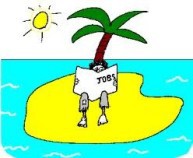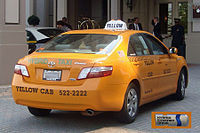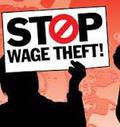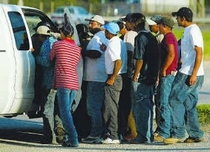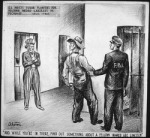Working while homeless
Below are some ideas for working while homeless. These include day labor (work today, paid today) taxi driving, and recruitment, employment agencies or temp services, like Kelly Services. These jobs can lead to regular employment too.
Taxicab
Wikipedia
A taxicab, also taxi or cab, is a type of vehicle for hire with a driver, used by a single passenger or small group of passengers, often for a non-shared ride. A taxicab conveys passengers between locations of their choice. In modes of public transport, the pick-up and drop-off locations are determined by the service provider, not by the passenger, although demand responsive transport and share taxis provide a hybrid bus/taxi mode. Read more
__________________________________________________
Kelly Services, Inc. is a Fortune 500 company headquartered in Troy Michigan, offering services that include temporary staffing
services, outsourcing, vendor on-site and full-time placement. Kelly operates in 37 countries and territories. Kelly employs more than 530,000 individuals annually, in areas including office
services, accounting, engineering, information technology, law, science, marketing, creative services, light industrial, education, and health care. Revenue in 2010 was $5 billion. Read more
Labor Ready
Each year, Labor Ready dispatches approximately 400,000 Temporary Associates to jobs in construction, manufacturing, hospitality, events, restoration, auto services,
logistics and warehousing, retail support, waste and recycling and more. More than 225,000 businesses of all sizes throughout the United States and Canada use Labor Ready when they need a dependable
source of labor. We take pride in quickly matching the right worker with the right job. That means not only knowing our Temporary Associates strengths – it also means knowing the policies and working
styles of every one of our customers. Read more
Manpower
Whether you're just entering the workforce or have decided on a career change, Manpower can help. We've been a world leader in employment services for more than 60 years.
We know what it's like to look for a job. That's why our goal is to make the experience better and easier for you. We start by listening closely to understand your skills, interests and goals. Then
we work to give you choices that suit your work style and fit your lifestyle. Plus, we arm you with everything you need to get a great job - and to succeed on the job. Read more
Spherion
Spherion Staffing Services is a leading recruiting and staffing provider that specializes in placing administrative, clerical, customer service and light industrial
candidates in temporary and full-time opportunities. As an industry pioneer for more than 60 years, Spherion has sourced, screened and placed millions of individuals in virtually every industry
through a network of offices across the United States and Canada. Read more
Apple One
Founded in 1964, and built on a policy of helping quality individuals like yourself achieve your employment goals, AppleOne has grown to become the single largest
privately owned employment service in North America.
Offering full-service career assistance and numerous special benefits, AppleOne can help you with everything from temporary projects to direct hire (permanent placement)
positions. And, with over 200 offices located throughout the United States and Canada, you'll always find an AppleOne close to the places where you live and work! If you are moving to a new location,
chances are there's already an AppleOne in place, ready to serve you. Read more
Adecco
The Adecco Group is the world’s leading provider of HR solutions. With approximately 33,000 employees and over 5,500 branches, in over 60 countries and territories around
the world, we offer a wide variety of services, connecting over 750,000 associates with well over 100,000 clients every day. The services we offer fall into the broad categories of temporary
staffing, permanent placement, career transition, talent development and workforce management solutions, as well as outsourcing and consulting.
The Adecco Group is based in Zurich-Glattbrug, Switzerland and we are a Fortune Global 500 company listed on the SIX Swiss Exchange. Read more
The Select Family of Staffing Companies
The Select Family of Staffing Companies is an American company that provides temporary and permanent staff.
A member of the American Staffing Association, The Select Family is ranked as the 8th-largest employment agency in the United States (2nd-largest for industrial staffing,
8th-largest for office/clerical, and 12th-largest for finance/accounting) and the 16th largest in the world. The company primarily offers services in human resources, and has over 400 offices in 45
states.
The company's major divisions include Select Staffing, Remedy Intelligent Staffing, RemX Financial Staffing, RemX IT Staffing, RemX OfficeStaff, RemX Search &
Placement, RemX Engineering, RemX Scientific, Select Truckers Plus, Project Solvers (design), Westaff, and Select Medical Staffing.
Temporary work, Wikipedia
Temporary work
Wikipedia
Temporary work or temporary employment refers to a situation where the employee is expected to leave the employer within a certain period of time. Temporary employees are sometimes called "contractual", "seasonal", "interim", "casual staff", "freelance"; or the word may be shortened to "temps". In some instances, temporary professional employees (particularly in the white-collar worker fields, such as law, engineering, and accounting) even refer to themselves as "consultants" (not to be confused with management consultants).
Temporary workers may work full-time or part-time, depending on the individual case. In some instances, temporary workers receive benefits (such as health insurance), but usually benefits are only given to permanent employees. Not all temporary employees find jobs through a temporary employment agency. For example, a person can simply apply at a local park for seasonal jobs.
A temporary work agency, temp agency or temporary staffing firm finds and retains workers. Other companies, in need of short-term workers, contract with the temporary work agency to send temporary workers, or temps, on assignments to work at the other companies. Temporary employees are also used in work that has a cyclical nature, requiring frequent adjustments to staffing levels.
In 2008 there were a total of 13,722 temp agencies and staffing services in the United States with revenue of over $7.4 million per firm.[1] Read more
Wage theft, Wikipedia
Wage theft, Wikipedia
Wage theft is the illegal withholding of wages or the denial of benefits that are rightfully owed to an employee. Wage theft, particularly from low wage legal or illegal immigrant workers, is common in the United States, according to some studies.[1][2] Wage theft can be conducted through various means such as: failure to pay overtime, minimum wage violations, employee misclassification, illegal deductions in pay, working off the clock, or not being paid at all. These violated rights have been guaranteed to workers in the United States since 1938 by the Fair Labor Standards Act (FLSA). read more
- Attorney General Eric T. Schneiderman, obtained $2M judgment against Papa John's franchisee. AG video link
- An Epidemic of Wage Theft Is Costing Workers Hundreds of Millions of Dollars a Year, Economic Policy Institute
- More Workers Are Claiming ‘Wage Theft’, New York Times
- Papa John’s To Pay Delivery Workers $2M For Wage Theft
- Cuomo orders emergency measures for nail salon workers
- A.G. Schneiderman And DOI Commissioner Peters Announce Arrest Of Five Public Works Contractors Charged With Underpayment Of Nearly $1 Million In Wages To Workers
Day labor, Wikipedia
Below image: Passaic, NJ - Police in Passaic are cracking down on day laborers who solicit work anywhere but at a city-sanctioned hiring center. Also, ACLU Refuses To Meet American Day Laborers
Wikipedia
Day labor (or day labour in Commonwealth spelling) is work done where the worker is hired and paid one day at a time, with no promise that more work will be available in the future. It is a form of contingent work.
Informal day labor is not new to the United States, and day laborers are not always migrant workers in many cases. In his study of day laborers in Atlanta, Terry Easton interviews white and black day laborers in addition to Hispanic workers.[10] Many other metropolitan areas still have non-immigrant day laborers, and many other large and small cities have immigrant day laborers from a variety of countries, including Mongolia, Poland, Russia, Brazil, Central and South America, and countries in Africa. Non-immigrant informal day labor, seen in many cities, does not generate the controversy or calls to police and local government seen when immigrant day laborers gather to wait for work.[citation needed]
Unorganized day labor creates real problems for day laborers: 1 in 3 corner day laborers have experienced theft of wages in the past two months; 1 in 5 experienced a serious worksite injury in the past year.[7] Low wages and poor working conditions, employer abuse, and lack of insurance for work related accidents is common.[11][12]
Numerous complaints are made about immigrant day laborers. These include loitering, noise, crime and rushing cars of potential employers in parking lots. Cities and counties have tried a variety of solutions with varied success. Some municipalities and communities have supported workers' efforts to organize themselves into democratically run workers' centers, designated areas, and organizations to defend workers' rights in general. Workers' Centers of this kind date back at least 18 years[when?] to Los Angeles. Other municipalities have targeted day labor sites for aggressive enforcement of immigration laws.[13]
Though united in their commitment to the rights of immigrant workers, NDLON and the Day Labor Research Institute represent two very different models of day labor center. NDLON represents the "social service agency model" and the Institute the "day laborer designed model."[14] These different models of day labor centers may yield markedly different results that reflect the different goals of each model.[14]
Problems when workers' centers are established are also common: day laborers often continue to congregate in large numbers on the streets surrounding the day labor centers, refusing to leave the street and use the center;[15] new problems can be created, including new crowds of homeless and substance abusers loitering near the center after hours, and large numbers of day laborers drawn from other areas to the streets surrounding the centers.[16] Low levels of work at the centers, low wages, and problems with the job distribution system are also common.[17] Read more
Peon and Peonage, Wikipedia
Also see:
Hodges v. United States, 203 U.S. 1 (1906) wikipedia
Bailey v. Alabama, 219 U.S. 219 (1911) Wikipedia
Peon Wikipedia
Peonage is a type of involuntary servitude of laborers (peons) having little control over their employment conditions. Peonage existed historically during the colonial period, especially in Latin America and areas of Spanish rule. Wikipedia
After the American Civil War of 1861-1865, peonage developed in the Southern United States. Poor white farmers and formerly enslaved African Americans known as freedmen who could not afford their own land would farm another person's land, exchanging labor for a share of the crops. This was called sharecropping and initially the benefits were mutual. The land owner would pay for the seeds and tools in exchange for a percentage of the money earned from the crop and a portion of the crop. As time passed, many landowners began to abuse this system. The landowner would force the tenant farmer or sharecropper to buy seeds and tools from the land owner’s store, which often had inflated prices. As sharecroppers were often illiterate, they had to depend on the books and accounting by the landowner and his staff. Other tactics included debiting expenses against the sharecropper's profits after the crop was harvested and "miscalculating" the net profit from the harvest, thereby keeping the sharecropper in perpetual debt to the landowner. Since the tenant farmers could not offset the costs, they were forced into involuntary labor due to the debts they owed the land owner. Wikipedia
After the U.S. Civil War, the South passed "Black Codes", laws that tried to control freed black slaves. Vagrancy laws were included in these Black Codes. Homeless or even unemployed African Americans who were between jobs, most of whom were former slaves were arrested and fined as vagrants. Usually lacking the resources to pay the fine, the "vagrant" was sent to county labor or hired out to a private employer. The authorities also tried to restrict the movement of freedmen between rural areas and cities, to between towns. Under such laws, local officials arbitrarily arrested tens of thousands of freedmen and charged them with fines and court costs of their cases. White merchants, farmers, and business owners could pay their debts and the prisoner had to work off the debt. Prisoners were leased as laborers to owners and operators of coal mines, lumber camps, brickyards, railroads, quarries, and farm plantations, with the revenues for their labor going to the states. Government officials leased imprisoned blacks and whites to small town entrepreneurs, provincial farmers, and dozens of corporations looking for cheap labor. Their labor was repeatedly bought and sold for decades after the official abolition of American slavery.[4]
Southern states and private businesses boomed with this free labor. It is estimated that up to 40% of blacks in the South were trapped in peonage in the beginning of the 20th century. Overseers and owners often used severe deprivation, beatings, whippings, and other abuse as "discipline" against the workers.[5]
After the Civil War, the Thirteenth Amendment prohibited involuntary servitude such as peonage for all but convicted criminals. Congress also passed various laws to protect the constitutional rights of Southern blacks, making those who violated such rights by conspiracy, by trespass, or in disguise, guilty of an offence punishable by ten years in prison and civil disability. Unlawful use of state law to subvert rights under the Federal Constitution was made punishable by fine or a year's imprisonment. Until the involuntary servitude was abolished by president Lyndon B. Johnson in 1966, sharecroppers in Southern states were forced to continue working to pay off old debts or to pay taxes. Southern states allowed this in order to preserve sharecropping.
In October 1910 Florida sugar cane plantation planter Edgar Watson[6] was shot and killed by his own neighbors; according to legend he would use peonage Native American and Negro help and then would "pay" his workers by killing them.[7] His story was fictionalized by writer Peter Matthiessen in his Lost River Trilogy later remade into Shadow Country
The following reported Court cases involving Peonage:
- 1903 South Dakota a 17-year-old girl was reported to have been sold into peonage at the age of two by her own father[8]
- 1904 Alabama ten persons Indicted for holding black and white persons in peonage[9]
- John W. Pace of Alabama-the "father" of Peonage; pardoned by his friend President Theodore Roosevelt in 1906.[10]
- Edward McCree of Georgia Legislature; owner of 37,000 acres of land; indicted on 13 charges. Pled guilty to first charge and paid a $1,000.00 fine.[11]
- 1906 Five officials of Jackson Lumber Company sentenced in Pensacola Florida to seven years in prison.[12]
- 1916 two men found guilty in Lexington County South Carolina of trying to force a white man into peonage; each fined $500.00 and sentenced to a year and day in jail[13]
- 1921 Hawaiian Sugar Plantation owners try to Legalize peonage of Chinese workers.[14]
- 1921, Georgia farmer John S. Williams and his black overseer Clyde Manning were convicted in the deaths of 11 blacks working as peons in Williams' farm.[15][16] Williams was the only white farmer convicted for killing black peons between 1877 and 1966.[17]
- 1922 Convicted in 1921 for hopping a freight train without a ticket in Florida, Martin Tabert of North Dakota becomes part of State Convict leasing; he died Feb 1, 1922[18] for being whipped for being unable to work due to illness. Reports of his death lead to outlawing of convict leasing in Florida in 1923.[19]
Because of the Spanish tradition, peonage was still widespread in New Mexico Territory after the American Civil War. Because New Mexico laws supported peonage, the US Congress passed an anti-peonage law on March 2, 1867 as follows: "Sec 1990. The holding of any person to service or labor under the system known as peonage is abolished and forever prohibited in the territory of New Mexico, or in any other territory or state of the United States; and all acts, laws, … made to establish, maintain, or enforce, directly or indirectly, the voluntary or involuntary service or labour of any persons as peons, in liquidation of any debt or obligation, or otherwise, are declared null and void."[20] The current version of this statute is codified at Chapter 21-I of 42 U.S.C. § 1994 and makes no specific mention of New Mexico.
The actress Julie Parrish appeared as Mariana Jaramilio in the 1967 episode "Along Came Mariana" of the syndicated television series, Death Valley Days, hosted by Robert Taylor. In the story line, Mariana works against great odds and tradition to unravel the peonage system in the New Mexico Territory.[21]

